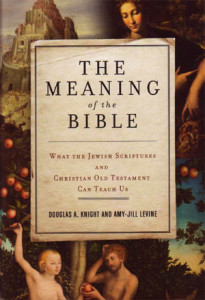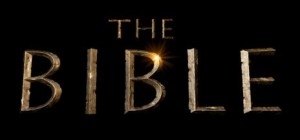Ever since I took Steve Walker’s Bible as Literature class at BYU in the early 80s, I have been smitten with the Old Testament (OT). Here at D&S I’ll be starting a column focusing on the Hebrew Bible and its peculiar charms, not as a devotional text, but as a whopping good read, as if it were any modern work of literature we might read for pleasure in a book club. It’s my opinion, that, like the widow’s cruse of oil blessed by Elijah (a great story!), the OT, if read with a creative and critical eye, never fails us.
Let’s face it. Growing up Mormon, one tends to view the Bible, especially the Old Testament, as a scriptural stepchild, something acceptable to the extent translated correctly, sure, but not our first choice to read for unadulterated doctrine. But, as Professor Walker used to lament, “the Bible is the best book you’ll never read.” Now, with the advent of “The Bible” series on The History Channel, it’s even back in style. I suggest that rather than looking to always supplement a read of the Bible with the Joseph Smith Translation (JST) or any other modern LDS gloss on the text, we should also be engaging the text as it has come down to us, warts and all, without a Mormon veneer. Of course we’ll take advantage of modern scholarship to deal with textual corruption corrections and understanding historical and literary context, etc., in order to understand the text, but what I’m saying is it’s so much more enjoyable to ask ourselves, for instance, why in Genesis 24 Father Abraham has his servant put his hand under Abraham’s thigh when making an oath to go find Isaac a wife than it is to be merely satisfied with the JST saying Abraham and his servant “shook hands” in agreement. If you’ve never explored this archaic oath-taking procedure, stay tuned.
 If you are looking for a friendly guide to read as you join us on this trip, I’d recommend the breezy text written by Slate editor David Plotz as he blogged the Hebrew Bible a couple of years ago titled Good Book: The Bizarre, Hilarious, Disturbing, Marvelous, and Inspiring Things I Learned When I Read Every Single Word of the Bible. It has a short, jaunty summary of every chapter of the OT. If you have a more scholarly temperament, I’d recommend Knight and Levine’s learned, yet approachable, The Meaning of the Bible: What the Jewish Scriptures and Christian Old Testament Can Teach Us.
If you are looking for a friendly guide to read as you join us on this trip, I’d recommend the breezy text written by Slate editor David Plotz as he blogged the Hebrew Bible a couple of years ago titled Good Book: The Bizarre, Hilarious, Disturbing, Marvelous, and Inspiring Things I Learned When I Read Every Single Word of the Bible. It has a short, jaunty summary of every chapter of the OT. If you have a more scholarly temperament, I’d recommend Knight and Levine’s learned, yet approachable, The Meaning of the Bible: What the Jewish Scriptures and Christian Old Testament Can Teach Us.
I’ll close with a Moroni-like literary challenge from Professor Walker: “The Bible is better than To Kill a Mockingbird, Huckleberry Finn and The Lord of the Rings put together” (Walker, “Why I Read the Bible,” Irreantum (September 1999), 23). Join us as we put this promise to the test.



I had that same class!
You know what they say about great minds . . . . .
Great minds … take the same classes? What year did you take it?
Yay! I’m so glad you are giving us this. Thank you! I can’t express how frustrated I am about not knowing what the bible MEANS by what it is saying!
By the way, did you ever read “The Year of Living Biblically: One Man’s Humble Quest to Follow the Bible as Literally as Possible” by A. J. Jacobs. Very Funny! And heartening!
Hey Carrisa–glad you’ll join us. I love AJ Jacobs. I’ve read everything he’s written except the Know-It All book about reading the encyclopedia. My favorite chapter was the one in which he stones the adulterer with a pebble.
Ed, great reading list. I’ll have to check one of these out!